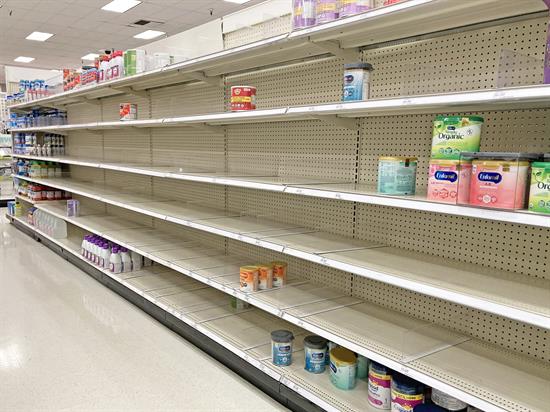- Meet Ralph
- Current Issues
- Serving You
- Emergency Preparedness
- Tele-Town Hall Signup
- Help with a Federal Agency
- Expedited Passports
- Visiting Washington
- Meeting Request
- Service Academy Nomination
- Congressional Commendation
- Appropriations Request
- Flag Request
- Federal Grants
- Congressional App Challenge
- Congressional Art Competition
- Surplus Books
- Internships
- Kids Page
- Media
- Contact
Blog
About the Baby Formula Shortage
South Carolina,
May 15, 2022
Over 40% of our nation’s baby formulas are currently out of stock. That’s according to Datasembly, a company that tracks retail inventory. This figure is up from 31% just a month ago. A normal out-of-stock rate should be around 10%, according to the Wall Street Journal. I’ve personally heard from many parents who are terrified, and who are desperately scrambling to find formula for their babies. If you are a parent in search of formula, or if you know someone who is, I have a separate post with a collection of tips from various pediatricians and retail experts. You can find that post here: https://norman.house.gov/news/documentsingle.aspx?DocumentID=1307 For this post, however, let’s cover some of the many reasons that have contributed to this shortage. First, the baby formula industry was already facing the same supply chain problems that almost every other industry has been facing. Manufacturers have wrestled with delays in their raw materials, delivery of goods, and lack of available labor. Compounding the problem is that one of the largest producers of baby formula in our nation is Abbott Nutrition. Earlier this year, Abbott issued a massive recall following reports of contaminated formula. In fact, one of the biggest Abbott production facilities in Michigan was shut down as a result. According to the company, it could be another two weeks or so before that facility is back online. This has caused a massive disruption in the supply of formula nationwide. Next, as is often the case, I believe big government has made the problem worse. The “Special Supplemental Nutrition Program for Women, Infants, and Children” (WIC) sends federal dollars to the states for, among other things, supplemental food for low-income citizens. When it comes to baby formula and WIC benefits, each state contracts with a single manufacturer. And guess what? Abbott is the sole provider for about half of all infants in the WIC program, according to CNN. So that’s obviously a problem. Fourth, the United States applies tariffs up to 17.5% on formulas imported from other countries. Additionally, there are quotas on formula imports from places like Canada. All of that was done to help protect domestic manufacturing of formula, but needs to be urgently revisited. Fifth, as one might imagine, there are some rather stringent labeling requirements from the U.S. Food & Drug Administration (FDA). Other nations that we might import from often don’t have these requirements, which can represent an obstacle to getting formula imported. There are other factors as well, but the bottom line is that the formula shortage is a crisis that needs national attention. Here’s what I’m working on in Congress: 1. I’m calling on the FDA to use all available personnel and resources at its disposal to ensure that once the Abbott facility in Michigan is ready to resume operations, that FDA inspections and approvals are handled in the most expeditious manner. 2. I will likely support legislation to temporarily lift the tariffs on imports of formulas from other countries. (Assuming this legislation isn’t derailed with superfluous garbage like Green New Deal or “Build Back Broke” funds.) 3. I will likely support waivers for states to allow WIC parents to purchase other brands not covered by their state’s program. I’ll also be looking at legislation enabling states to contract with more than one manufacturer for formula in their WIC programs once things settle back down. The devil’s in the details for this type of legislation, so we’ll have to see how it comes together. 4. I’m also working on efforts that would temporarily enable the import of foreign-made formulas that – to an extent – don’t meet all the nitty-gritty labeling requirements of the FDA. Those formulas will still need to pass rigorous FDA approval and safety inspections, of course, but labeling should not be the hang-up when we’re in the middle of a crisis. I’ll post more information as it becomes available. Also remember, if you or someone you know is a parent in need of baby formula, I have a separate post with a collection of tips from various pediatricians and retail experts. You can find that post here: https://norman.house.gov/news/documentsingle.aspx?DocumentID=1307 |
